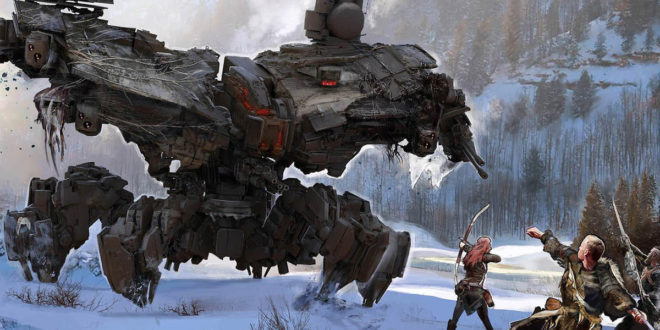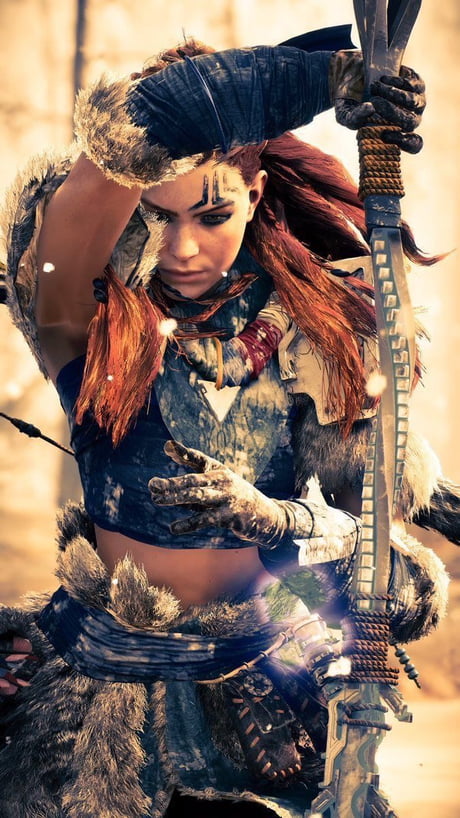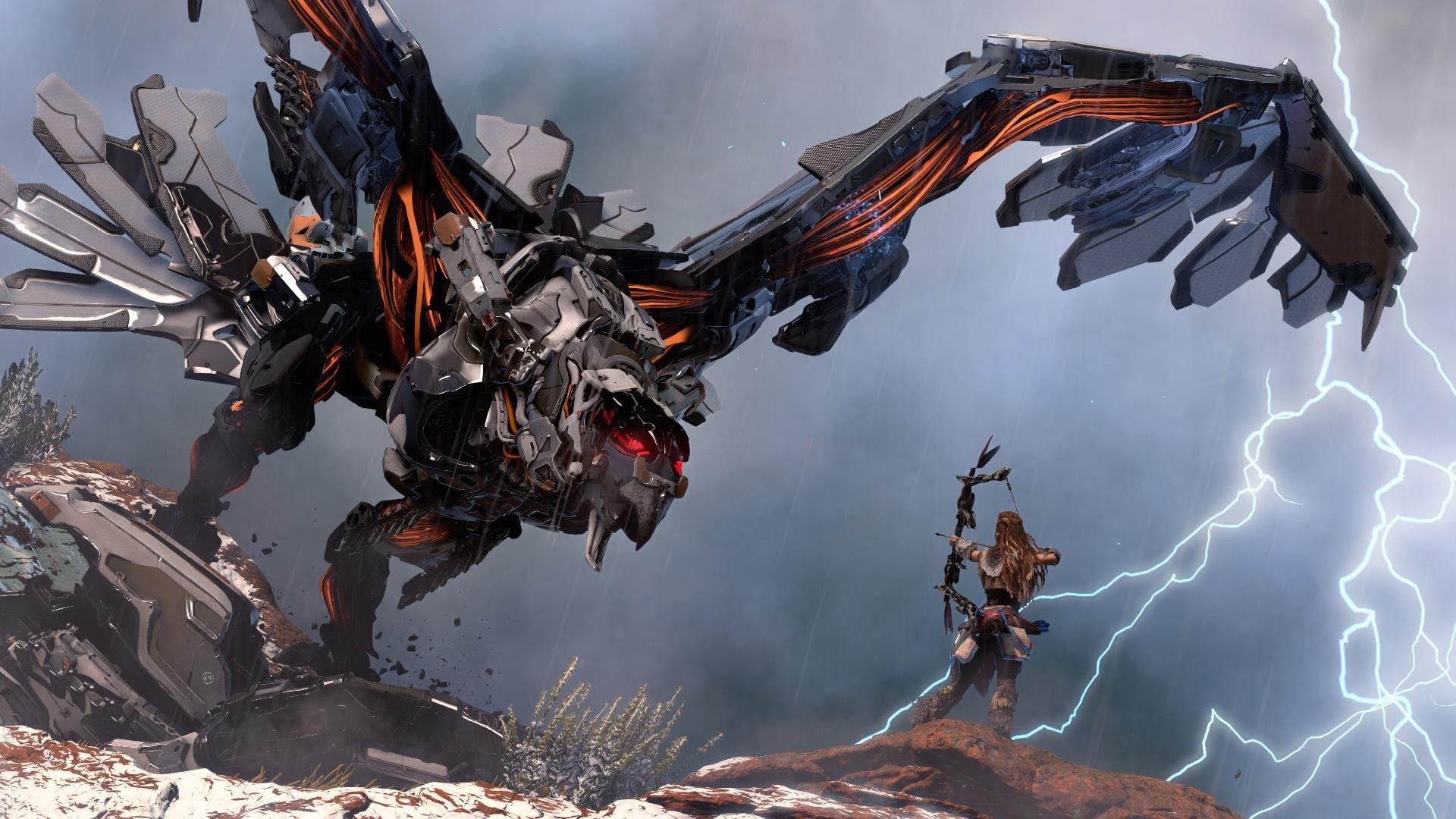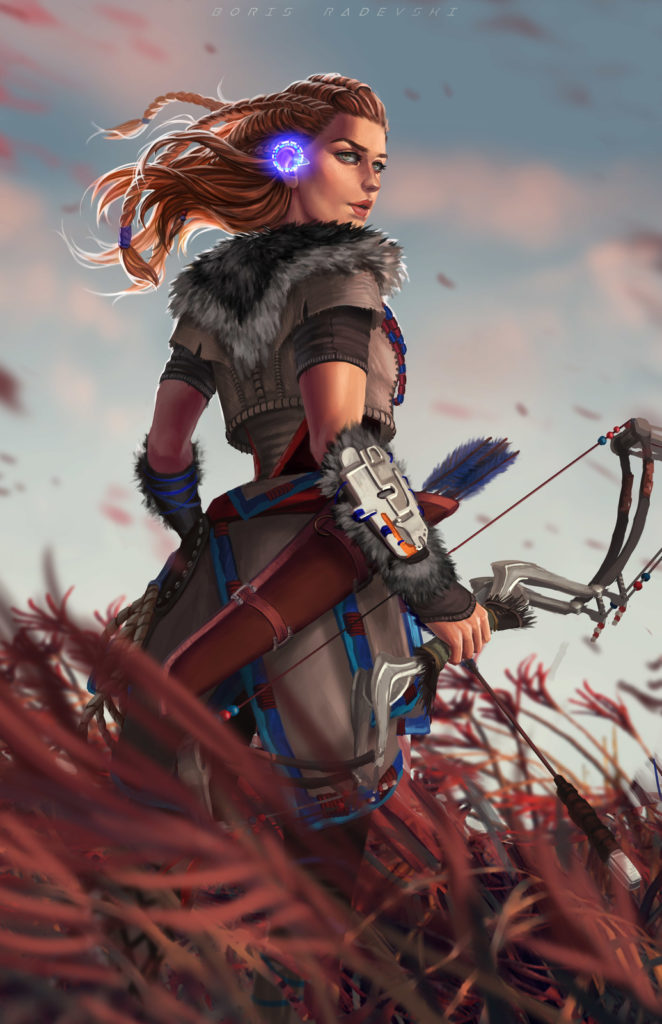
Having played through Horizon: Zero Dawn leaves my mind wracked with contemplations. Admittedly, the tribal culture theme didn’t stick much with me as my interest lies more so in the technological developments of humanity’s preservation methods and… well, robots. This game was simply charming in its approach to uncovering secrets of the Old Ones and the ancient world; I did not expect a lore so comprehensive.

Let me start with an example. Aloy’s journey as an outcast begins with her questioning family and bonds. Namely, she has none which to speak of and Rost’s demise early in the game sets her on a lonely path, riddled with questions and no answers. An agonizing process to seek the truth only to be denied it, and to pursue knowledge to deadly affectations (looking at you, Dr. Frankenstein). Aloy has a burgeoning conundrum; it is not simply that the Matriarchs of the Nora withhold the truth of her birth an existence, the entire world lacks the knowledge of her birth beyond her suddenly appearing in front of a giant metallic door without parents.
All of these factors kickstart an incredible foray into Aloy’s path strewn with robotic corpses. the world is not the vast of ideas or safety, it is one to be survived and feared as factions contend with one another. Aloy is a powerful and intelligent archer who must explore ruins to discover a truth (much like a beloved Lara Croft). Yet Aloy is brash, confident, and hot-blooded, fueled by an inferiority complex at being a clone and contending with social anxiety during interactions with warlords, military leaders… and admirers. She is born of contradiction, and her personality and abilities are magnetic, to put it lightly. From start to finish, I felt as though I was experiencing history replay alongside Aloy.
Aloy was not “born” so to speak, but discovered. Her life after was of fear, mistrust, and abandonment. The elders held her as the anti-Christ, the hellspawn while others saw her as a blessing. A very few, however, saw her as a young woman trying to get by while being an Outcast for reasons unknown. She lived both free and trapped as she associated – but was not part of – her own tribe. Aloy’s story is beautifully woven with religious contemplation of what it means to be alive and serve in the world without any parallels to religious works or forcing symbolism onto her character, let the elders deal with that. Along with a select few characters, Aloy otherwise shines in engagement and her behavior; there is a touch of sarcasm dripping from most of her sentences, no doubt in part from her Outcast status, subtle bitterness toward her tribe on Rost’s behalf, and minimal interaction with other humans.
Overtime, Aloy becomes unsure of herself. She is unsure of her place in the world, which is a complicated and painful process for most of us. This vulnerability is uncommon in video game protagonists, who often come equipped with skills, friends and knowing what their role is. Aloy has none of these in the beginning, she is only a curious girl exploring ruins where she is attacked by tribe members for something not her own fault. In this way, she goes through life never missing a beat when it’s time to clap back at people who would otherwise judge or scorn her for her status: she contends with sexism and distrust and does not play the noble, understanding type. She is the first to get in someone’s face and defend herself and others if need be, and does so without violence. Through her rising skillset and remarkable survival tactics, Aloy tames her inner power, and this becomes her crux for her character growth and narrative for the audience.
Her snarkiness and dry wit lend the player a voice to air concerns. She is certainly not a plucky character with “genki girl” qualities, from start to finish she is firm and stands strong even when the reality of her existence unravels faster than she can keep up with. Forever keeping her cool is a constant of her character.
GAIA: The Origin of the Future
While I was not impressed at her basically copy-paste appropriated outfit from Native Americans, through Aloy’s confrontation with the past, I was deeply impressed at Guerilla Game’s depiction of GAIA: a powerful and sentient AI developed by humanity’s greatest minds to offset complete annihilation from the Faro Plague.
GAIA itself was not all-powerful, rather a deity of human origin, with Earth’s best interests at heart to sustain humanity – those native to Mother Earth. The developers stick to biological facts well by having GAIA be of African descent, mirroring humanity’s first known ancestors walking the breathtaking lands of Africa before spreading across the globe, acclimating and developing a civilization, which in itself comes language, history, culture, politics, and relationships. I digress.
GAIA has its own nine (9) subordinate functions, with their own task:

- AETHER: Detoxify Earth’s atmosphere and biosphere
- APOLLO: Archive and teach human history and culture
- ARTEMIS: Reintroduce Earth’s faunal species via cloning
- DEMETER: Reintroduce Earth’s floral species via cloning
- ELEUTHIA: Reintroduce and raise cloned human species
- HADES: Reverse unsuccessful terraforming attempts
- HEPHAESTUS: Manufacture Zero Dawn terraforming machines via Cauldrons
- MINERVA: Brute force Faro Plague deactivation codes; construct Plague shutdown transmission towers
- POSEIDON: Detoxify Earth’s water supply
ELEUTHIA and the Cradle that spawned Aloy likely placed her outside to be found and later stop HADES from reawakening the ancient machines. Yet all accounts of the world seem to go no further back than 20 years. While this is because the world has a Big O (rant coming soon!) theme of the world simply not existing before that point or the writers not bothering with anecdotes and stories on account of the characters is beyond me and point for another discussion.
To understand the world of Horizon: Zero Dawn, knowing the history of that world is essential to immersion. Though many of the important bits about the people themselves is relegated to datapoints and audio files, the game’s underlying ludo-narrative excels in reconciling the relationship between a mistrusting humanity and its subconscious fears of repeat elimination.

The Faro plague was not a “plague” per se, rather a systematic process of eliminating life from earth with a swarm of “killer robots”. That began as a well-intentioned defense system. These robots in-game – from Strider to Fireclaw – presented some of the best robotic designs and combat patterns I have seen to date. Yet next-gen robots preying upon a 21-century human without knowledge of the hunt and self-defense would be a problem.
Dr. Sobeck’s impressive intervention pinpointed humanity’s demise in no more than 15 months from the release of Ted Faro’s robots, who seemingly built them with the intent of becoming rich and having fun.
This reminds me something fierce of Frankenstein and the pursuit of knowledge being incredibly dangerous in the wrong hands.
Faro’s robots implemented “human” traits for what are peacekeeper robots:
- Biomatter Conversion. Just as humans eat animals and plants, these incomprehensibly powerful robots would be part of the ecosystem and climb the food chain. Faro did not account for his robots to eat and consume human life as well, and without defense systems in place outside of militaristic weaponry, humanity could do little from becoming nutrients for the robots. As Sobeck feared – despite her intellectual and innovative genius – the robots would not stop at humans and simply eat whatever form of life they could until the Earth was rendered barren. This was successful, and all of humanity was eradicated until its reseeding nearly a thousand years later.
- Self-Replication. This creates a dangerous dichotomy of reproduction to enforce generational violence and consumption for robots that are very clearly not sentient. In-game visuals depict robots being built at rapid paces and deployed for immediate combat and search functions. While robots like the Grazer – based on a deer – is likely to run, a Trampler or Thunderjaw will not offer the same mercy, and yet can reproduce itself via Cauldrons and the HEPHEAESTUS Subordinate Function It takes a bold narrative decision by an author to make a killing machine capable of replication, ensuring the eternal perpetuation of fear and violence.
- Hacking Invulnerability. Titled “Polyphasic Entangled Waveforms” designed to encrypt a connection preventing backdoor capability and was beyond military grade OS cybersecurity and cryptography. While MINERVA by transmitting a shut-down signal to al Faro machines centuries later, Faro designed the robots to avert permanent destruction and hacking from outside parties, which is bended later as an outside party hacked HADES, who then spread this to the rest of the Subordinate Functions – specifically Hephaestus – who worked to build corrupt machines within Cauldrons that attack humans. This hacking caused the Derangement 20 years ago and made once docile animals become ravenous and predators to the tribal factions of Horizon: Zero Dawn.
Perhaps – in my opinion – Faro’s most egregious act of averting humanity’s mistakes in the future was ridding the world of the Alphas, lead designers of Zero Dawn:
Dr. Elisabet Sobeck: Alpha Prime: Director overseeing Zero Dawn and Developer of terraforming system’s AI (GAIA)
Charles Ronson: Responsible for developing ARTEMIS, responsible for global restoration of fauna
Samina Ebadji: Developer of APOLLO subfunction, responsible for archival and dissemination for all pre-extinction knowledge, art, language, culture, and history for humans in the far future. APOLLO was destroyed before it could be implemented, causing ELEUTHIA to raise children into adulthood without teaching them past kindergarten level.
Travis Tate: Developer of HADES subfunction, responsible for reversing unsuccessful terraforming attempts and returning the world to zero for GAIA to try again.
Patrick Brochard-Klein: Developer of ELEUTHIA, responsible for cloning stored human DNA, incubation, and birthing children. This included raising and teaching the children.
Margo Shen: Developer of HEPHAESTUS subfunction, responsible for constructing the millions of machines that were originally meant to detoxify parts of the planet to recreate sustainable climate for humans to reinhabit.
Naoto: Developer of DEMETER, responsible for global restoration of flora.
On Preserving Knowledge
I was especially surprised with the APOLLO subfunctions’ erasure at Ted Faro’s discretion. As someone who enthuses about the advancement and distribution of knowledge and finds the concepts of forbidden knowledge hidden from sensitive eyes exciting, I found Faro’s despair event horizon heinous and lacking in foresight. His motivations came from covering his bases to ensure future humanity never comes to know that he was the cause of its eradication. This is baseless in nature outside of a superiority and guilt complex and instead ensures that humans will always have questions about the world that will never be answered due to lack of knowledge, something even modern humans like us face when concerning the birth of our universe. Faro’s motivations are selfish in nature; what he derides as human error that he wishes future humans never recreate is a thin veil to excuse his own motive for not living in infamy. This bites Sobeck and the Alphas later; Faro, being the chief bankroller of Zero Dawn as the world’s first trillionaire, offers him a higher degree of access independent from the Alphas. His funds granted him power over the Zero Dawn preservation project, permitting him to erase the APOLLO archives.

The conservation of knowledge and information is critical to the development and intellectual stimulation of the human mind and environment. Knowledge which is preserved carefully by tenacious keepers, guardians and librarians creates an environment that holds knowledge to be sacred and worth passing on through literature, visual arts, and oratory. The test of time challenges that process, and withers knowledge not properly utilized or taught. Erasing data stored digitally or on shelves robs people of knowledge that could be instrumental to their survival.
It is an irrational mind to create logic unsound as Faro’s, though his motivations made sense. Killing the Alphas meant that there would be no one in the world left skilled enough to rebuild APOLLO, though no one would know it existed in the first place, let alone fix it, because as a black budget project funded by a man with connections to the government, he would have clearance to the entire project’s undertaking and control its ability.
He could not accept his shortcomings and required Dr. Sobeck’s intervention to spare him from public ire (which she browbeat into him due to his stubbornness). He could not allow Dr. Sobeck to remain his better and caused great peril to those around him to feed his ego.
APOLLO likely would have extensive intel on Faro’s contribution to the world being barren. Its erasure means that civilizations to come after the Faro Plague and restored by GAIA and ELEUTHIA would not be properly educated beyond being provided basic care. Sending still primitive and unknowingly cloned humans into a still hazardous world they cannot comprehend put them into a constant state of fear, violence and superstition. This in turn created tribal communities and warrior cultures that rejects technological development and causes a stasis in knowledge building. Much like the early human.
While wanting people to not repeat mistakes is a noble goal, Faro’s insistence on erasing his name from all records to be passed onto the future is his attempt to absolve further guilt and condemnation. It is not worth destroying humanity to protect your own ego.
- There is a separate point to be made: while humanity may have repeated Faro’s mistake in the future had they been granted access to the entire compendium of human history, destroying that archive before it denies them the choice to learn entirely. It is not anyone’s place to assume that humans would repeat a mistake when there lies the chance it will be repeated anyway, knowledgeable of the past or not. Despite the incredible access and control Faro had over Project Zero Dawn, it was still not his call to alter the course of human learning simply because he desired total control and the absolution of guilt. His private Faro Automated Systems company is his domain, that which is under complete executive control. Humanity, its DNA and its very history is a delicate resource, not to be altered and destroyed to satisfy an impetuous desire.
APOLLO was not only responsible for the reintegration of human knowledge into generational society, it was also responsible for teaching humans how to reintroduce wildlife to the world and how to assist GAIA in terraforming the lands to become habitable. APOLLO’s destruction limits humans to being unable to commune, breed or align with animals beyond hunting, which would cause another starvation extinction later. Basic medical, farming and building knowledge is critical to survival, and this knowledge is also kept from the new generation of humans, causing them to develop this knowledge at a far slower pace.

All existent knowledge had been erased. Charles Ronson spoke oblivion into words of substance, that Ted Faro committed cultural obliteration. That is irredeemable for members in-game, and my own personal worldview. Knowledge itself is a resource, a tool, and a means of understanding one another. Without it, cultural, social and political norms are set back decades from a clear lack of agreeance. Faro’s isolated behavior and lack of consultation with his peers on this course of action implies his awareness of breaking moral code and embarks on it anyway. A fascinating character. While corrupt, he is written in such a way that his actions leave me with a brain-breaker. It is pleasant to see that so many people encourage the preservation of knowledge with care and abhor a lack of it, while those who have knowledge purposely remain ignorant because it is so widely available. Someone order up a cruel irony?
The fight between Dr. Sobeck and Faro lasted centuries beyond their death, a testament to humanity’s strong will to live and need for sustained existence on Earth despite the odds. Yet wuthout knowledge in the future in an attempt to hold onto power, Ted Faro led humans to return to short, violent and brutish lives without the means to protect, education or treat themselves. Power and CEO’s are regularly given connections beyond simply uber-managing, yet Faro’s belief that humans are better off without this information due to the sins of the present eliminate the future survival of humans. To this end, he caused the downfall of his own company, and even further destroyed his reputation in the tired, bored”humanity is evil” cliche that most technology-esque media seems to portray. On closer inspection, the game is huge on criticizing capitalism and the effects of unchecked megacorporations and CEO’s, with consistent disregard for cultural attitudes in favor of uptick in profits.

Nevertheless, having Aloy’s development as an inquisitive and cautious young woman understanding the constructions of the past made for a refreshing play. A game which creates a social commentary on the repercussions of the consolidation of power and the consequences of historical and cultural genocide while having a strategic, strong heroine at the center, is a win in my book. Easily in my top five games of all time.
We are a hardy bunch.
Until the next rant, fellow humans.
-N